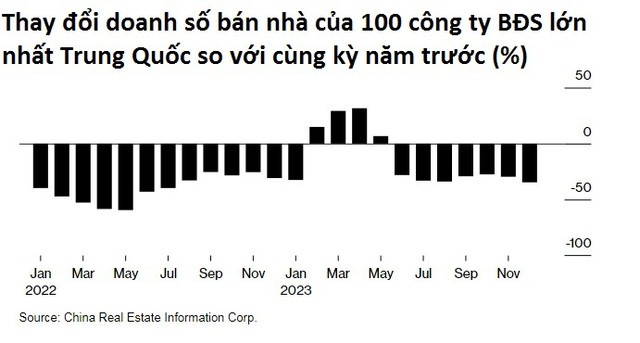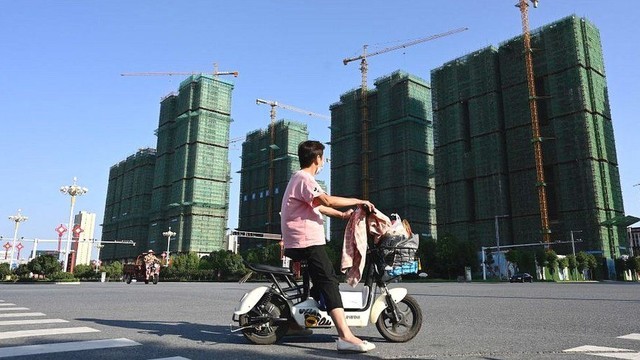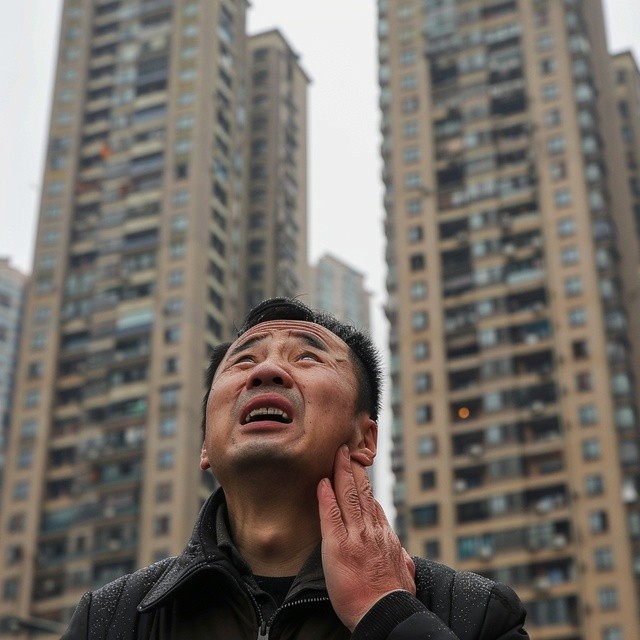The Financial Times (FT) reports that since the relaxation of Covid-19 lockdown measures in 2022, real estate broker Wu Hong has been busy searching for new clients instead of waiting for them to come to her.
“Now I have to spend a lot of time looking for clients, to the point of begging, but very few people buy,” says Ms. Wu.
According to the FT, despite Ms. Wu’s active efforts, her sales results have been disappointing. The number of new homes sold in the city of Wuhu, where Ms. Wu works, only increased by 10% compared to the 448 units sold in December 2022. This number is less than 2/3 of the 1,341 units sold in January 2022.
Ms. Wu’s story and the situation in Wuhu reflect the challenges in the Chinese real estate market, which used to be the driving force behind the entire economy.

However, for the past 2 years, the impact of the Covid-19 pandemic, along with the tightening of capital flow management by the Beijing government, has caused the entire real estate market, including brokers like Ms. Wu, to struggle.
In response to the FT, real estate brokers said that Wuhu has an excess of empty apartments, despite being only 300km east of Shanghai and considered a densely populated area.
“Homebuyers have returned to the market, but they are more cautious in their purchasing decisions because they fear that housing prices will continue to decline,” says a real estate project development director in Wuhu.
Grim situation
The real estate sector in China is estimated to account for up to 30% of the country’s total GDP and is closely linked to the local financial system. Many local budgets depend mainly on revenue from land sales and rental with real estate development projects. Not to mention the credit provided by local banks to stimulate the local real estate market.
In 2022, land sales for development projects brought in CNY 6.7 trillion, equivalent to USD 990 billion, or 1/3 of the total budget revenue in China.
However, the government’s tightening of credit management to prevent real estate speculation and limit risks in the financial system has left project owners in need of capital, resulting in bankruptcy, project freezes, and slower progress that reduces sales and housing prices.
Ironically, this only makes buyers more cautious, leading to reduced sales, which in turn affects companies’ finances, creating a vicious cycle.

Data from financial firm Wind shows that the sales of new homes in China’s 30 largest cities in 2023 decreased by 31% compared to the previous year and are still falling.
Similarly, data from the National Bureau of Statistics of China (NBS) also show that prices of newly built homes in the country have reached the lowest point in 9 years despite rescue efforts by the government. Housing sales in this economy in December 2023 decreased by 23% compared to the same period the previous year.
Meanwhile, total investment in real estate projects up to December 2023 decreased by 9.6% compared to the same period the previous year, the fastest decline since 2000.
NBS statistics for the 70 largest cities in China show that 62 cities saw a decrease in housing prices in December 2023, higher than the 59 cities in the previous month.
In the second-hand housing market, housing prices in these 70 cities have been on a continuous decline for 7 months at all urban levels.
Tears in the domestic market
In Wuhu, a 90m2 apartment is priced at around CNY 900,000, equivalent to USD 133,000, only 4/5 of the price during the same period the previous year. However, the faster the price drops, the more cautious buyers become.
As a result, real estate brokers have resorted to various methods to close deals. Instead of adhering to the government-set prices to avoid market collapse, many brokers evade the law by taking lower prices and compensating the remaining amount with agricultural products.
Other brokers offer cash, insurance, or assets of equivalent value as compensation for the price difference compared to the set price.

In a special case, the Golden Scale House project in Wuhu even proposed a renovation subsidy of CNY 230,000 valid for 1 month after the completion of the contract, a new type of law evasion.
However, this proposal from the Golden project has increased housing sales by 33%, but the excessive promotions have resulted in little profit. The law evasion promotion by Golden is up to 20% of the total value of a 3-bedroom apartment at the project.
“We had a terrible year, so we had to find a way to generate cash flow to survive, even with very little profit,” an anonymous source at Golden told the FT.
The FT reports that many projects in Wuhu have only 10% of occupied apartments, with the majority being speculative purchases, waiting for prices to rise. However, in the current stagnant market, everything becomes difficult.
“How can you expect housing prices to rise when there are so many discounted apartments?” says an undisclosed project owner in Wuhu to the FT.
“It will take a lot of time to regain the trust of buyers and the real estate market,” says a real estate project director in Wuhu with a heavy heart.
Source: FT
By Bang Bang





![[Photo Essay]: Experts, Managers, and Businesses Unite to Forge a Path Towards Sustainable Green Industry](https://xe.today/wp-content/uploads/2025/07/z678592918-150x150.jpg)


![[Photo Essay]: Experts, Managers, and Businesses Unite to Forge a Path Towards Sustainable Green Industry](https://xe.today/wp-content/uploads/2025/07/z678592918-100x70.jpg)



